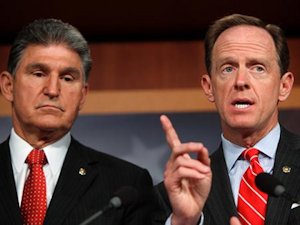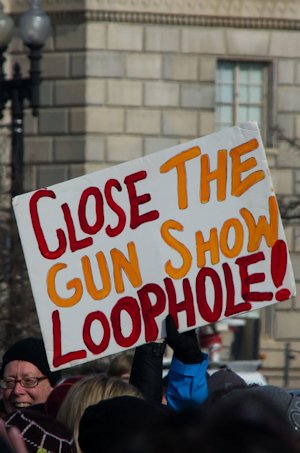Rethinking Gun Control, Part 8: Background Checks and Gun Show Loopholes
 | | "I'm not sure why the bill failed, but I'm guessing it was his fault." |
In a Rolling Stone interview last May with Vice President Joe Biden, the interviewer, Douglas Brinkley, prefaced one of his questions with, "the background-check measure failed in the Senate, even though it was supported by 90% of the American people." However, one week earlier, Gallup released a poll that stated that only 65% of the American people supported the measure. Where did Brinkley get the higher figure? According to an earlier, more loosely-worded poll, 91% of respondants said they would support a law requiring "criminal background checks for all gun sales," even though, just three months later, the exact same question netted a slight decrease to 83%. While Brinkley's premise was imprecise, the general idea--that a majority of people in this country support stronger background checks for gun purchases--appears to be true. This, then, raises the question: can our background checks be strengthened?
The "measure" being discussed above is, of course, the Toomey-Manchin bill (officially titled "The Public Safety And Second Amendment Rights Protection Act"), a bill that, among much else, expands the currently existing background check requirement to sales that take place over the Internet or at gun shows. It has specific language that exempts family members from requiring background checks, though it doesn't talk about in-person sales between friends and neighbors (despite the assurances of Senators Toomey and Manchin). After all the hype surrounding its introduction, it did indeed fail to pass a Democratically-controlled Senate, with its slightly bipartisan majority support unable to overcome a minority filibuster.
If gun shows and Internet sales were all the bill addressed, it probably would have passed the Senate (and possibly the House), even under the committed opposition of the NRA (which argued it was unserious and ineffective). However, dig a little deeper into the bill, and you'll find other provisions that may have been objectionable enough to lose the vote.
 | | I'm sure sufferers of paranoid personality disorder will understand that mental health providers will only give their information to the government under very restrictive circumstances |
Among those is a subsection that PolitiFact describes as "[encouraging] states to provide all available records to the National Instant Criminal Background Check System by directing grant money to the states and reducing federal dollars to states that donít comply." In other words, the bill puts pressure on individual states to adopt the standards of the existing national database and punishes states that refuse. To uneasy conservative types, this reeks of an expansion of federal power and an erosion of state rights, even as supporters argue that such overarching standards are necessary because firearms travel across state lines without impediment.
More troublesome for the bill, however, is the requirement that mental health records be expanded in the national background check database. As the Senate vote approached, Gun Owners of America put out an alert stating, "It is urgent that every gun owner call their Senators today and demand that they oppose the 'See a Shrink, Lose your Guns' sell-out bill that is being authored by Senators Pat Toomey and Joe Manchin." Few people disagree that the issue of mental health is central to any discussion of gun violence and gun control in America today. However, people are extremely divided on how to handle it, and anything that even hints at the possibility that psychiatric help will put you on a bureaucratic watch list--in effect disincentivizing treatment and potentially making mental health problems worse--is likely to cause a backlash, regardless of how warranted or unwarranted such concerns are. With that in mind, it is important to note that the bill tries to be careful about only including mental health records that are "extreme" or "violent" in nature and which do not violate patient privacy laws.
Unfortunately for those who wish to see swift legislative action in America, it is exceptionally rare for lean, single-issue bills to be put before either Congressional body. There are almost always those who will refuse to vote for something because it doesn't go far enough, and those who will refuse because it goes much too far. There is a give and take involved with writing bills, and in order for a bill to get wide enough support to even get put up for a vote, it has to satisfy different, sometimes disparate interests. This is why, despite the roughly 90% support for a law that simply requires background checks to be expanded, we are unlikely to see a bill that does only that and nothing more. And, as Toomey-Manchin demonstrates, the bigger a law gets, the more things constituents can find objectionable. When a bill gets on the wrong side of an advocacy group (such as the NRA or, on the left, NARAL), it puts pressure on legislators from both sides of the aisle to withdrawal support.
 | | "You know, this sign is all the evidence I need of Toomey-Manchin's effectiveness" said no Senator |
This is also why I object to Brinkley and others conflating the "90%" figure with the Toomey-Manchin bill, because the question that Gallup asked had nothing to do with a specific bit of existing legislation. Sure, 65% is still a big show of support (that's more popular support than any president-elect has ever enjoyed), but when you make it sound like opposition to a bill can only come from opposition to the stated intentions of a bill, you lose an enormous amount of nuance. Such assumptions ignore unintended consequences, legal questions, hidden provisions of the law, the complexity of the law, or the possibility that the title of a bill (and the publicity surrounding it) doesn't necessarily reflect its substance.
So let's narrow it down to a specific issue, that of the "gun show loophole" which the Toomey-Manchin bill attempts to address. Let's say for the sake of argument that this was the only thing the Toomey-Manchin bill addressed. The NRA's statement of opposition sure makes it sound that way. According to the NRA, it would oppose such a bill because "expanding background checks at gun shows will not prevent the next shooting, will not solve violent crime and will not keep our kids safe in schools." Whether or not that's true is speculative at best, but let's consider it anyway.
For starters, what is the gun show loophole? In effect, the idea is that, at a gun show, a person can buy a firearm without any kind of criminal background check, thereby subverting most legal requirements for such checks. While it is possible to find an unlicensed dealer at a gun show, the vast majority of gun sales take place between licensed dealers who are required by law to run background checks. According to a 2001 study by the Justice Department, only 0.7% of prison inmates acquired their gun from a gun show, background check or not. While this data doesn't make the gun show loophole a myth as many claim, it also doesn't mean that "40%" of gun sales are done without background checks, as both President Obama and Vice President Biden have claimed. Yes, there is a loophole, but closing it for good is unlikely to make much of a dent, if any, in violent crime. After all, criminals who wish to subvert background checks have much simpler methods than going to their nearest gun show.
Given that, I find it hard to believe that closing the loophole would cause any dire unintended consequences, and on the substance, I support the intentions of the Toomey-Manchin bill, even if I find aspects of it troubling. I don't think criminal background checks are a bad idea (though, to be fair, I haven't spent the time to do a statistical analysis of their efficacy, nor am I likely to), and I do think there are problems worth addressing when it comes to our approach to the mentally ill. However, even if all the Toomey-Manchin bill did was close the gun show loophole and expand background checks to Internet sales, I'm not convinced it would stop the next Newtown. At the end of the day, the Toomey-Manchin bill failed because it was perceived as political theater, an effort by Congress to appear to be doing something as concerns over gun violence were filling the headlines.
-e. magill 7/8/2014
|
|